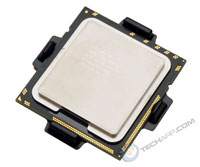Conclusion
There is no doubt that Turbo Boost improves performance. It is only a matter of how much effect it has on real-world performance. The maximum effect Turbo Boost has varies from 266 MHz up to 933 MHz, so the actual performance of different Core i7 and Core i5 processors will differ significantly from their official clock speeds.
Our test results showed that Intel Turbo Boost will improve the performance of the Intel Core i7-975 Extreme Edition and the Intel Core i7-965 Extreme Edition processors by 4-5 % in CPU-intensive applications. Games, which are by nature graphics-intensive, will still benefit from the speed boost but in much smaller quantums of 1-2 %.
Of course, these results were based on two Core i7 processors which are limited to an upper limit of just one speed bin (+ 133 MHz) when two or more cores are active, and a maximum of two speed bins (+ 266 MHz) when only a single core is active. In contrast, the Core i7-860S processor gets "boosted" by an astounding 933 MHz, from its official clock speed of 2.53 GHz to 3.46 GHz! Needless to say, Turbo Boost would have a much larger effect on its real-world performance.
With that said, Turbo Boost is still a much-welcomed feature even in Core i7 and Core i5 processors that only benefit by 1-2 speed bins. It is essentially a free "upgrade" for users who can't be bothered to overclock, or are using motherboards that do not allow manual overclocking. It also works dynamically - kicking in when it's most needed and turning off to save power and reduce thermal output when the processor is idle.
We recommend you keep Turbo Boost enabled, unless you are manually overclocking the CPU or testing the processor using a benchmark (e.g. the x264 HD Benchmark 3.0). Enabling Turbo Boost will skew the results, making your Core i7/i5 processor appear faster than it really is. So keep that in mind if you are benchmarking your system! Please see this article for the full details.
If you want to find the lowest prices on Intel Core i7 or Core i5 processors, you can find them here! To make it easy for you to determine which Core i7 / i5 processor has the best Turbo Boost limits, here's our reference table again :
Processor |
Turbo |
4 Active Cores |
3 Active Cores |
2 Active Cores |
1 Active Core |
Core i7-975 EE |
3.33 GHz |
3.46 GHz |
3.46 GHz |
3.46 GHz |
3.60 GHz |
Core i7-965 EE |
3.20 GHz |
3.33 GHz |
3.33 GHz |
3.33 GHz |
3.46 GHz |
Core i7-960 |
3.20 GHz |
3.33 GHz |
3.33 GHz |
3.33 GHz |
3.46 GHz |
Core i7-950 |
3.06 GHz |
3.20 GHz |
3.20 GHz |
3.20 GHz |
3.33 GHz |
Core i7-940 |
2.93 GHz |
3.06 GHz |
3.06 GHz |
3.06 GHz |
3.20 GHz |
Core i7-870 |
2.93 GHz |
3.20 GHz |
3.20 GHz |
3.46 GHz |
3.60 GHz |
Core i7-860 |
2.80 GHz |
2.93 GHz |
2.93 GHz |
3.33 GHz |
3.46 GHz |
Core i7-920 |
2.66 GHz |
2.80 GHz |
2.80 GHz |
2.80 GHz |
2.93 GHz |
Core i5-750 |
2.66 GHz |
2.80 GHz |
2.80 GHz |
3.20 GHz |
3.20 GHz |
Core i7-860S |
2.53 GHz |
3.46 GHz |
3.46 GHz |
3.46 GHz |
3.46 GHz |
Core i5-750S |
2.40 GHz |
3.20 GHz |
3.20 GHz |
3.20 GHz |
3.20 GHz |
Core i5-670 |
3.46 GHz |
NA |
NA |
3.60 GHz |
3.73 GHz |
Core i5-661/660 |
3.33 GHz |
NA |
NA |
3.46 GHz |
3.60 GHz |
Core i5-650 |
3.20 GHz |
NA |
NA |
3.33 GHz |
3.46 GHz |
For more specifications, take a look at our Desktop CPU Comparison Guide. |
|||||
Support Tech ARP!
Help support our work by visiting our sponsors, participate in the Tech ARP Forums, or even donate to our fund. Any help you can render is greatly appreciated!
Page |
Topic |
|
1 |
• Intel Turbo Boost Technology Revealed |
|
2 |
||
3 |
||
4 |
||
5 |
||
6 |
||
7 |
||
8 |
||
9 |
||
10 |
Questions & Comments
Please feel free to post your questions or comments here!
| Date | Revision | Revision History |
| 05-01-2010 | 1.0 | Initial release. |
| 10-02-2010 | 2.0 | Updated the entire article. |







 Add to Reddit
Add to Reddit

